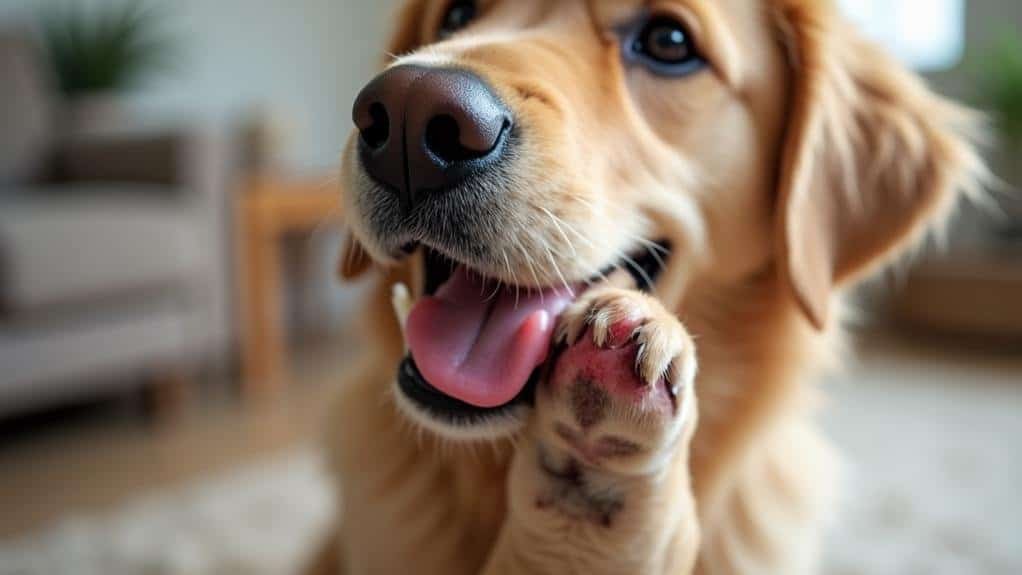Your furry friend’s paw-chewing habit can stem from various issues.
Common causes include allergies, skin irritations, injuries, or even anxiety.
If you notice your dog frequently nibbling on their paws, it’s time to pay attention.
Look for signs like redness, swelling, or changes in behavior.
While occasional paw licking is normal, excessive chewing might indicate an underlying problem.
Treatment options range from addressing allergies to providing mental stimulation, depending on the root cause.
Regular grooming and vet check-ups can help prevent many paw-related issues.
By understanding the reasons behind this behavior, you’ll be better equipped to keep your pup’s paws healthy and happy.
Common Causes of Paw Chewing
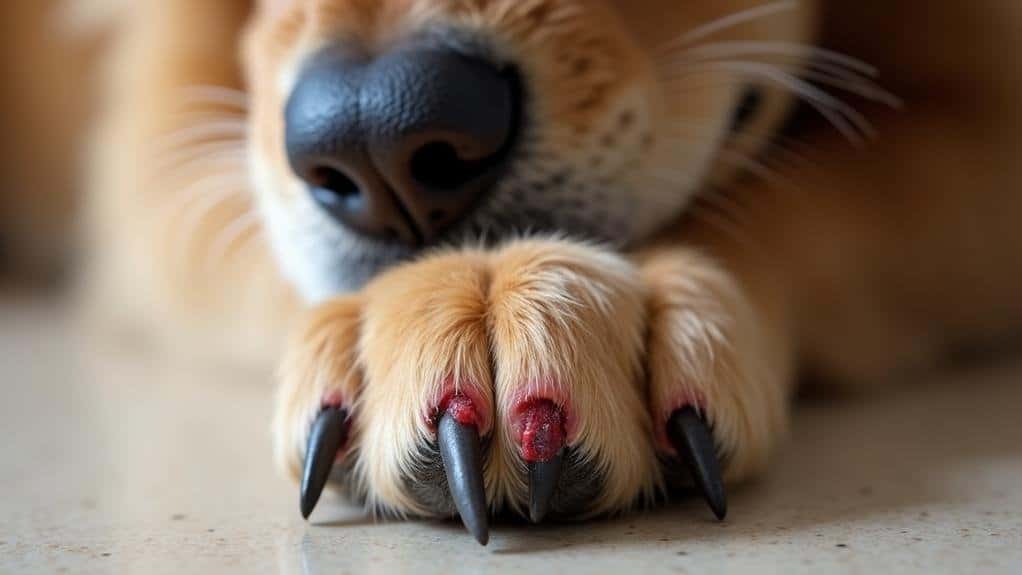
While dogs chew their paws for various reasons, several common causes stand out.
1. Health Issues
Your dog’s paw chewing could be a sign of underlying health problems. Pododermatitis, a condition that causes inflammation in the paw pads and nail beds, is a frequent culprit. It’s important to keep an eye out for any signs of swelling or redness.
2. Allergies
Just like humans, dogs can suffer from allergies. Whether it’s food, fleas, or environmental triggers, allergies often lead to intense itching. Your pup might turn to paw chewing as a way to relieve the discomfort.
3. Pain and Injury
If your dog’s suddenly taken an interest in chewing its paws, it could be due to pain or injury. Cuts, stings, or even arthritis can cause this behavior. It’s their way of trying to soothe the affected area.
4. Behavioral Issues
Don’t overlook the possibility of behavioral causes. Anxiety and boredom can lead to compulsive paw chewing, especially if your dog isn’t getting enough mental or physical stimulation.
Allergies and Skin Irritations
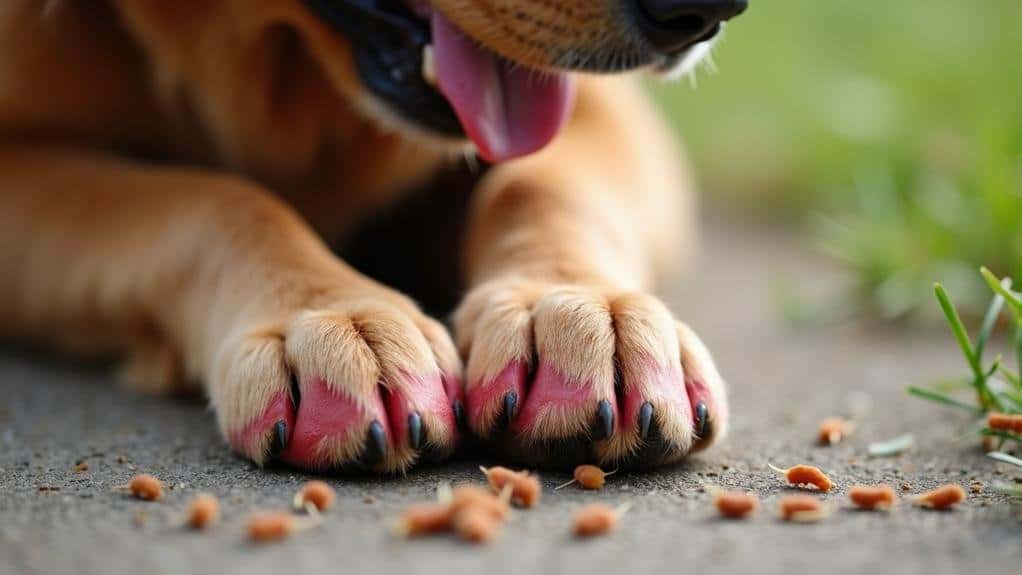
Identifying allergies and skin irritations in your dog can be challenging, but they’re often the culprits behind excessive paw chewing.
Dogs with itchy paws may constantly lick and chew them, trying to relieve the discomfort. Common allergens that trigger this behavior include environmental factors like pollen and dust mites, as well as certain food ingredients.
If you notice your furry friend obsessively chewing their paws, it’s essential to address the underlying cause. Left untreated, skin irritations can lead to secondary infections, making the problem worse.
One condition to watch for is pododermatitis, an inflammation of the paws that often results from allergies.
To help your pup find relief, consider these steps:
- Consult your vet for proper diagnosis
- Try antihistamines or steroids as recommended
- Consider a change in diet to eliminate potential food allergens
- Use hypoallergenic wipes to clean paws after walks
- Invest in protective booties for outdoor adventures
Injuries and Pain
Dogs often resort to chewing their paws when they’re experiencing pain or injury.
If you notice your furry friend excessively licking or chewing a specific paw, it’s time to play detective.
Here are some common causes of paw-related discomfort:
- Hidden injuries: Your pup might’ve stepped on something sharp, resulting in cuts or torn nails. Ouch!
- Uninvited guests: Foreign objects, like tiny pebbles or thorns, can get lodged in paw crevices.
- Environmental hazards: Hot pavement or bee stings can cause painful paw injuries.
- Dry or cracked paw pads: These can be as uncomfortable for your dog as chapped lips are for you!
Keep an eye out for other signs of pain, such as limping or decreased activity.
If you notice your dog favoring a particular paw, it’s time for a closer look.
Remember, untreated wounds can lead to infections and more severe health complications.
Parasites and Infections
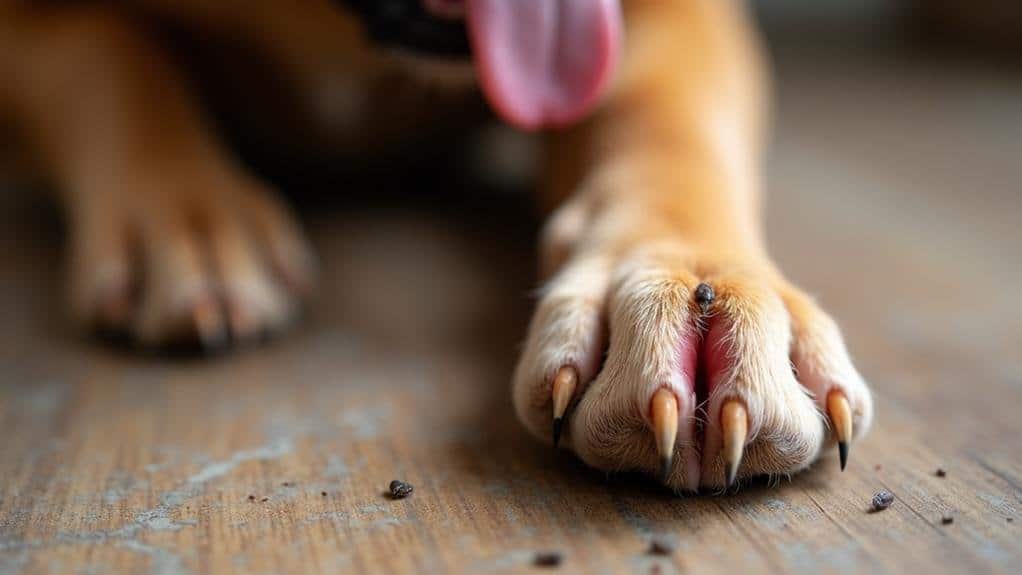
Occasionally, your dog’s paw-chewing habit can be traced back to unwelcome guests: parasites and infections. These tiny troublemakers can cause significant itching and discomfort, leading your furry friend to chew their paws incessantly.
Common culprits include fleas, ticks, and mites, which can set up shop between your dog’s toes and throw a real itchy party.
But that’s not all, folks! Moisture-loving yeast and bacterial infections can also crash the paw party, causing inflammation, funky odors, and even more discomfort.
It’s like a perfect storm for paw-chewing behavior. If your pup has underlying allergies, they’re more susceptible to these unwanted guests, potentially leading to secondary infections.
What can you do? Keep an eye out for these red flags:
- Visible bugs or flea dirt between the toes
- Excessive licking or chewing of paws
- Redness, swelling, or unusual odor
Anxiety and Behavioral Issues
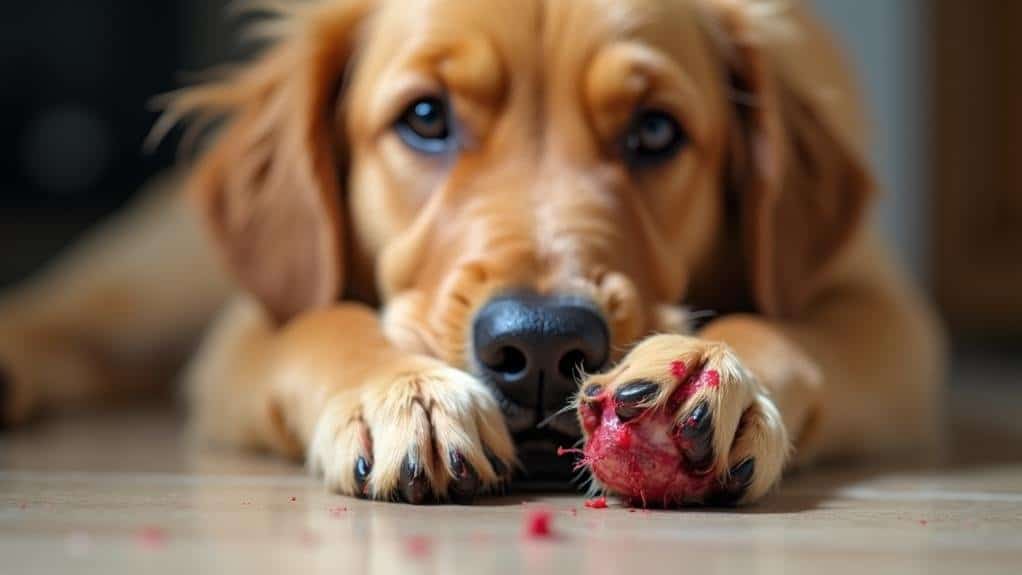
Just when you thought you’d ruled out physical causes for your dog’s paw-chewing habit, anxiety and behavioral issues enter the picture. Your furry friend might be using this seemingly odd behavior as a coping mechanism for stress or emotional discomfort.
Anxiety in dogs can manifest in various ways, and excessive paw chewing is one of them. If you notice your pup going to town on their paws, especially when left alone, it could be a sign of separation anxiety. This distressing condition can lead to destructive behaviors as your dog tries to self-soothe.
But it’s not just separation that can trigger this habit. Boredom and lack of mental stimulation can also drive your pooch to chew their paws out of frustration. Think of it as their way of saying, “Hey, I need something to do!”
To help your anxious pup, try these strategies:
- Provide interactive toys to keep their mind occupied.
- Use positive reinforcement training to build confidence.
- Establish a consistent routine to reduce stress.
- Consider consulting a behaviorist for severe cases.
Identifying Excessive Paw Chewing
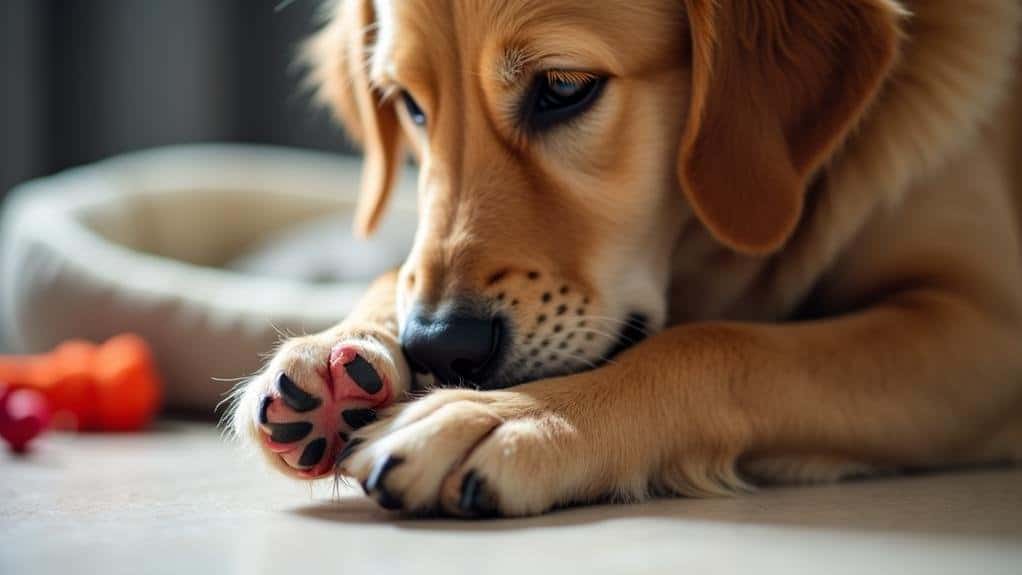
You’ve noticed your furry friend gnawing at their paws more than usual, but how can you tell if it’s crossed the line into excessive behavior? Identifying excessive paw chewing is essential for your dog’s well-being. Here are some key signs to watch for:
- Frequency and duration: If your pup’s licking and chewing becomes a constant activity, it’s time to take notice.
- Physical symptoms: Look out for redness, swelling, hair loss, or a funky odor around the paws.
- Behavioral changes: Is your dog more anxious or bored than usual? These factors can contribute to excessive chewing.
Remember, excessive paw chewing can indicate underlying health issues like allergies or infections. It’s not just a quirky habit – it can lead to self-inflicted injuries and secondary problems if left unchecked.
To help your vet get to the bottom of things, start documenting your dog’s chewing habits. Jot down when it happens, how long it lasts, and any triggers you notice.
This information will be invaluable during your next veterinary visit, ensuring your four-legged friend gets the proper care they need.
Treatment Options
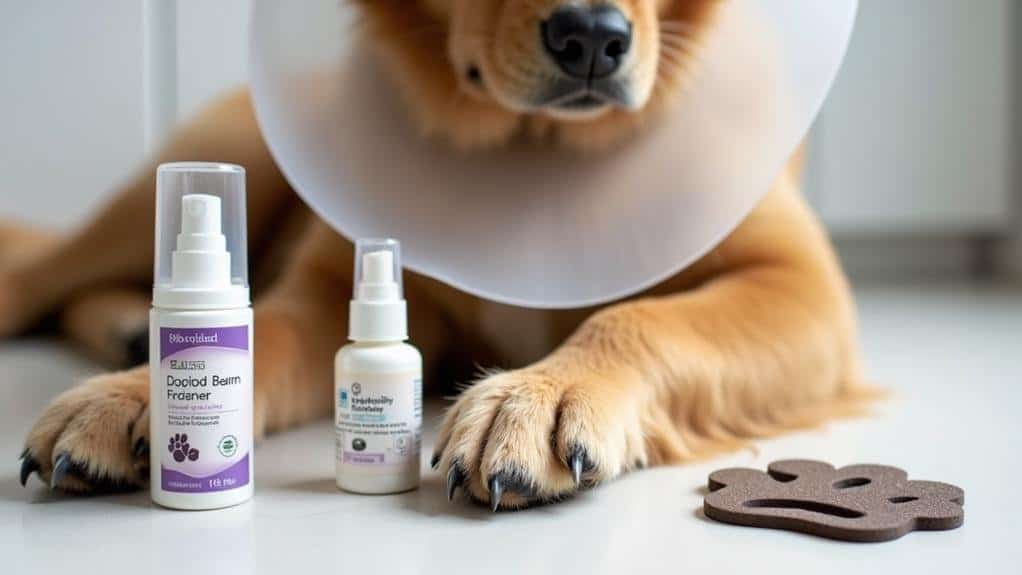
Once you’ve identified excessive paw chewing in your dog, it’s crucial to explore treatment options that address the root cause.
The first step is to consult with your vet for a proper diagnosis and treatment plan. They’ll help uncover any underlying medical conditions or allergic reactions that might be triggering the behavior.
Treatment options may include:
- Medications: Your vet might prescribe antihistamines, steroids, or antibiotics to tackle allergies, inflammation, or infections.
- Topical treatments: Creams and sprays can provide quick pain relief and soothe irritated skin.
- Behavioral training: Using positive reinforcement techniques, you can help your furry friend overcome anxiety-related chewing and licking.
- Environmental enrichment: Increase your dog’s physical and mental activities to prevent boredom and reduce destructive behaviors.
Prevention Strategies
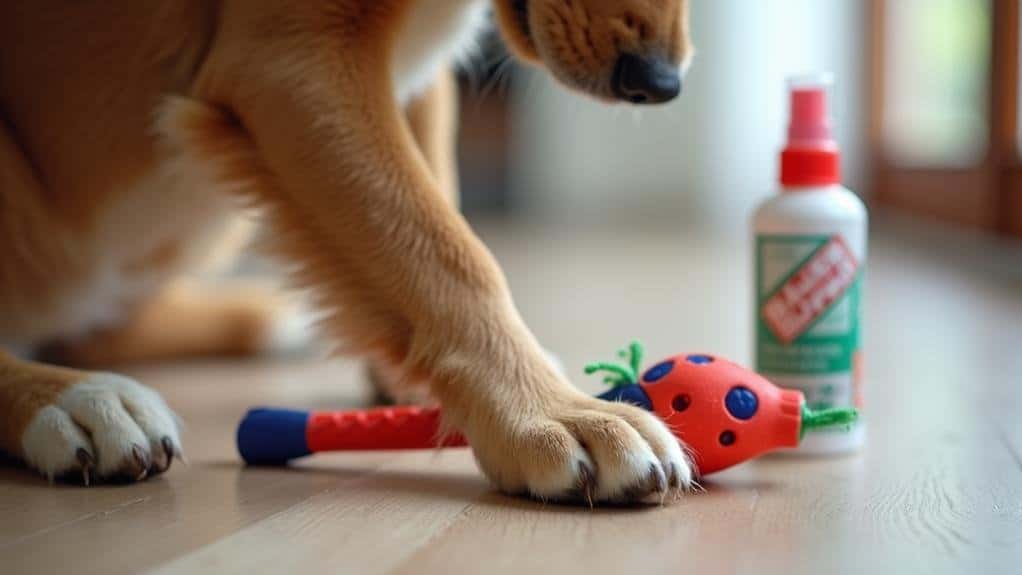
After addressing existing paw-chewing issues, it’s essential to focus on prevention strategies to keep your dog comfortable and healthy.
Implementing a regular grooming routine is key to maintaining clean and healthy paws, reducing the likelihood of irritation and chewing. Be sure to trim your dog’s nails and check for any debris or foreign objects that might cause discomfort.
Preventing allergic reactions is another important aspect of paw health. Identify and minimize your dog’s exposure to potential allergens, whether they’re in their food or environment. This can greatly reduce itching and the urge to chew.
Environmental enrichment plays a fundamental role in keeping your dog mentally stimulated and less prone to destructive behaviors. Provide interactive toys and increase physical activity to alleviate boredom and anxiety.
Don’t forget the importance of regular veterinary check-ups.
These appointments allow for early detection of health issues and guarantee proper health management. Your vet can also recommend calming techniques and products to reduce stress-related paw chewing.
Frequently Asked Questions
What Does It Mean When a Dog Chews Its Paws?
When your dog chews its paws, it could be normal grooming or a sign of health issues. It might indicate allergies, injuries, or behavioral problems. If it’s excessive or accompanied by other symptoms, you should consult a veterinarian.
How Do I Get My Dog to Stop Chewing His Feet?
You’ll need to address the root cause of your dog’s paw-chewing. Consult a vet, implement behavioral training, increase exercise, maintain paw hygiene, and consider using protective gear. These steps can help redirect your dog’s chewing habits effectively.
Should I Let My Dog Chew His Paws?
You shouldn’t let your dog chew his paws excessively. While occasional chewing is normal, frequent paw-chewing can indicate health issues. Monitor the behavior, provide distractions, and consult a vet if it persists to guarantee your dog’s well-being.
Should I Stop My Dog From Licking His Paws?
You shouldn’t immediately stop your dog from licking his paws. First, identify the underlying cause. If it’s excessive or accompanied by other symptoms, consult a vet. Address the root issue before attempting to modify the behavior.
Conclusion
As you’ve learned, your furry friend’s paw-chewing habit can stem from various causes, from pesky allergies to anxiety. It’s essential to keep a watchful eye on this behavior and consult your vet if it persists. Remember, you’re your dog’s best advocate! By addressing the root cause and implementing preventive measures, you’ll help your pup kick this habit to the curb. With patience and proper care, you’ll soon have a happy, healthy pooch with pristine paws.

